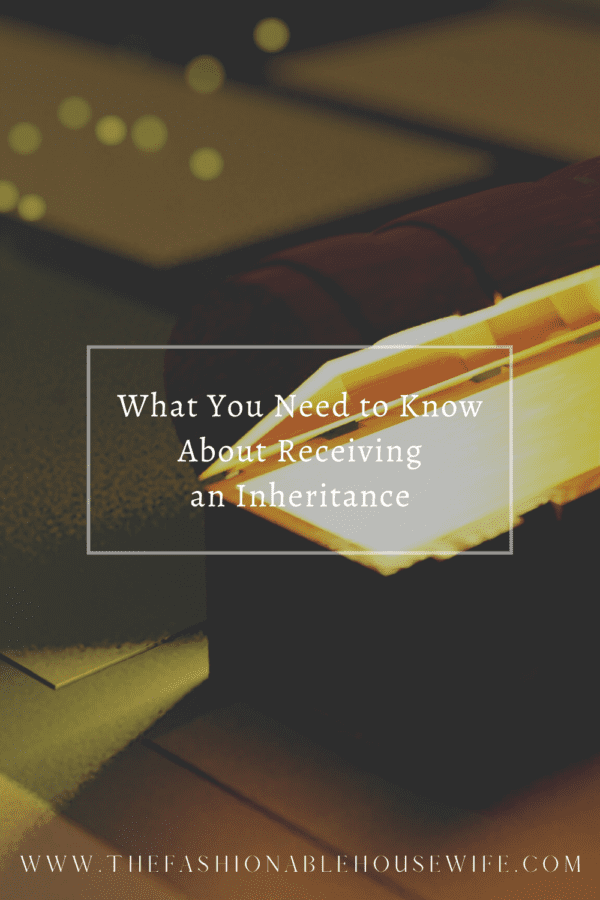
It’s always complicated when a family member passes away and leaves an inheritance for their loved ones. There’s the emotional weight of processing everything on top of figuring out a financial situation you may have never been in before. This guide explains what you need to know about receiving an inheritance so the process becomes more manageable.
1. Check for a Will
Many people create wills after they start owning property or having kids. Their will simplifies passing on their family’s inheritance by selecting specific beneficiaries for assets like real estate, stocks and potential cash endowments. When a loved one passes away, always check with their lawyer, any safe deposit boxes in their name or online spaces where they saved documents.
2. Look for Beneficiaries
Sometimes loved ones pass away before they can create a will. Other times, they might not have thought about making one at all. When a loved one doesn’t leave a will behind, you’ll have to create a list of assets and submit it to your local probate court. The probate court picks an administrator to split the assets, which takes much more time than if there was a will to determine those choices instead.
3. Prepare to Wait
If a probate court is in charge of sorting through your family’s inheritance, it will take a while to finish the process. Sometimes people wait months or years for the administrator to process related financial paperwork. In cases where family members need the inheritance money right away, they can initiate a probate advance process. The beneficiaries could receive same-day funding based on how much they stand to inherit from the estate.
4. Read the Fine Print
You might assume that as your loved one’s estate goes through processing, you’re only a few days or weeks away from receiving a large sum of money. In most cases, the fine print allocates small inheritance payouts over time. Read the will closely, speak with your attorney or contact the probate court’s designated administrator to discuss how much you’ll receive, when and how often.
5. Plan for Remaining Debts
Most people accrue debt during their lives and many don’t pay it off before they pass away. If you discover remaining debts for your loved one, you’ll likely get calls from a debt collector. When that happens, ensure that they’re following laws that restrict who they can talk to so they only speak with the deceased person’s:
- Spouse
- Executor
- Administrator
The collector cannot force you to pay the remaining debts from your personal funds. The will’s executor pays the debts through the remaining estate value and distributes what remains afterward to the beneficiaries.
6. Research Your State Laws
There is no federal law requiring everyone to pay an inheritance tax on what they receive from a deceased family member, but six states enforce inheritance taxes with varying amounts and deadlines. Research your state laws to see if you live in one of these places and owe:
- Kentucky: 4-16% due within 18 months
- Pennsylvania: 4.5-15% due within nine months
- Iowa: 4-12% due within nine months
- Maryland: 10% due within nine months
- New Jersey: 11-16% due within eight months
- Nebraska: 1-18% due within 12 months
You can calculate the exact amount owed with a certified public accountant (CPA) and any official helping you with your loved one’s assets. They’ll ensure that the government only gets what they’re legally entitled to so you can keep more funds that your family member would have wanted you to have.
7. Handle Retirement Accounts
When someone passes away with a retirement account in their name, there are a few ways to handle the remaining funds. Spouses and other beneficiaries named in the person’s will can check with the account’s regulator to discuss options like:
- Cashing it out immediately and paying related taxes
- Roll the IRA over into their own account
- Begin the five-year payout option
Sometimes account owners don’t designate beneficiaries for retirement accounts. If that is the case with your family, the probate court often chooses the five-year payout option rather than cashing out the funds.
8. Seek an Expert’s Help
You don’t have to worry about navigating financial laws while grieving for your loved one. Lawyers and financial planners can help you make the best decisions for your financial needs. They can transfer assets for you, communicate with the probate court and even ensure that the inheritance money distributes evenly among your family members.
It’s challenging to make decisions like these while overwhelmed with grief and loss. Trusting an expert could help you avoid accidentally making decisions you wouldn’t have chosen if you had more time to recover.
Learn About Receiving an Inheritance
Now that you’ve read what you need to know about receiving an inheritance, you can prepare for the future or get started with a probate court today. This is a complicated process for anyone, especially those reeling from a loved one’s death. Follow these steps and contact experts to find the best solutions for your family’s needs.



